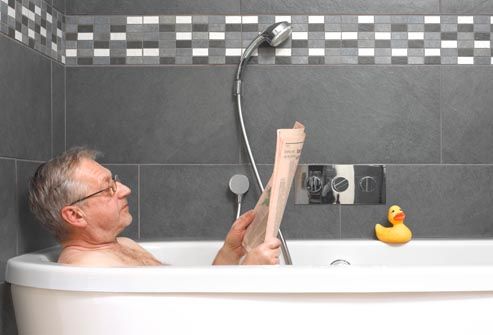10 Principles for Peace of Mind |
|
Whatever happened was
destined to happen only that way. Why cry over
spilled milk?
|
Thursday, November 29, 2012
10 Principles for Peace of Mind
Thursday, November 22, 2012
9 Surprising Benefits if you Sleep Well
9 Surprising Benefits if you Sleep Well
|
Nov 19 (3 days ago)
 |   | ||
| ||||
Please watch the educational film of 18 minutes produced inhouse by us for Everyone's Awareness.
Title: " Sleep...Its wonderful, isn't it?"
Log on:
Click: Sleep Video
9 Surprising Benefits if you Sleep Well
If you're getting less than the recommended seven or eight hours of sleep a night, here are nine reasons that you should shut down your computer, turn off the lights, and go to bed an hour early tonight.
1. Better health.
2. Better relations with spouse
3. Less pain. If you have chronic pain -- or acute pain
from a recent injury -- getting enough sleep may actually make you hurt
less. Many studies have shown a link between sleep loss and lower pain
threshold. Unfortunately, being in pain can make it hard to sleep.
Researchers have found that getting
good sleep can supplement medication for pain. If pain is keeping you
up at night, there are also medications available that combine a pain
reliever with a sleep aid.
4. Lower risk of injury. Sleeping enough might actually
keep you safer. Sleep deprivation has been linked with many notorious
disasters, like the destruction of the space shuttle Challenger and the
grounding of the Exxon Valdez. The Institute of Medicine estimates that
one out of five auto accidents in the U.S. results from drowsy driving
-- that's about 1 million crashes a year.
Of course, any kind of accident is
more likely when you're exhausted, says Jodi A. Mindell, PhD, a
professor of psychology at St. Joseph's University in Philadelphia and
author of Sleep Deprived No More. "When you're overtired, you're
more likely to trip, or fall off a ladder, or cut yourself while
chopping vegetables," she says. "Household accidents like that can have
serious consequences."
5.
Better mood.
6. Better weight control.
7.
Clearer thinking.
8. Better memory.
9. Stronger immunity.
Sunday, November 18, 2012
What causes Depression, myths abt it and the cures.
..must read as 1 out of six hv it....Alok (including me).
Depression Trigger: Overload
Squeezed between the demands of children, aging parents, marriage, and your job? Feeling sad, worthless, and guilty? Women tend to shoulder more of the "sandwich generation" burdens -- and up to half become depressed as a result.Solution: Make sure you're caring for yourself, too. Exercise, get enough rest, eat healthy, see friends, and get help -- for caregiving demands and depression -- if you need it.
Share this:
Trigger: Achy Joints
Living with a condition that causes chronic pain, such as rheumatoid arthritis or osteoarthritis, increases your chance of having depression. In fact, people with chronic pain are three times as likely to have depression or an anxiety disorder. And depression can make pain worse.Solution: Exercise, meditate, or listen to music. An hour of classical music a day has been shown to ease arthritis pain and depression. If the depression or pain doesn't lift, talk to your doctor.
Trigger: Perimenopause and Menopause
Trigger: The Empty Nest
If your child has left home, an "empty nest" can make you feel empty. Going through menopause or retirement at the same time may make it harder.Solutions: Try to see it as an opportunity. Reconnect with your spouse, other family members, and friends. Pursue hobbies and interests you didn't have time for before. Give yourself time to adjust. If your mood doesn't lift in a few months, talk to your doctor.
Trigger: Poor Sleep
Insomnia and other sleep disruptions, which are common as we age, are closely related to depression. Insomnia can be a sign that you are depressed, and if you have insomnia but aren’t depressed, you’re at higher risk of developing mood changes. Obstructive sleep apnea and restless legs syndrome also have been linked to depression.Solutions: Talk to your doctor about possible reasons for your sleep problems and get treatment for them. Learn good sleep hygiene habits, such as regular bedtime hours. Exercise early regularly and avoid caffeine, alcohol, or nicotine, which interfere with sleep. Prescription medication may also help.
Trigger: Loneliness
Trigger: Grief
Myth: Hard Work Beats Depression
Depression affects nearly one in six people at some point in their lives, so folk remedies and half-truths about this common illness abound. One such idea: throw yourself into work and you'll feel better. For a mild case of the blues, this may indeed help, but depression is a different animal. Overworking can actually be a sign of clinical depression, especially in men.Trigger: Retirement
Trigger: Heart Problems
Trigger: Blood Pressure Pills
Myth: Teens Are Unhappy by Nature
Although many teens are moody, argumentative, and intrigued by "the dark side," prolonged sadness or irritability is not normal for teens. When unhappiness lasts more than two weeks, it may be a sign of depression -- which develops in about one in 11 teens. Other signs a teen may need help include: being constantly sad or irritable even with friends, taking no pleasure in favorite activities, or a sudden drop in grades.Myth: It's Not a Real Illness
Depression is a serious medical condition -- and the top cause of disability in American adults. But it's still confused with ordinary sadness. Biological evidence of the illness can be seen in brain scans, which show abnormal activity levels. Key brain chemicals that carry signals between nerves (shown here) also appear to be out of balance in depressed people.Fact: Men Fly Under the Radar
A depressed man, his loved ones, and even his doctor may not recognize depression. That's because men are less likely than women to talk about their feelings -- and some depressed men don't appear sad or down. Instead, men may be irritable, angry, or restless. They may even lash out at others. Some men try to cope with depression through reckless behavior, drinking, or drugs.Myth: Depression Is Just Self-Pity
Our culture admires will power and mental toughness and is quick to label anyone who falls back as a whiner. But people who have clinical depression are not lazy or simply feeling sorry for themselves. Nor can they "will" depression to go away. Depression is a medical illness -- a health problem related to changes in the brain. Like other illnesses, it usually improves with appropriate treatment.Myth: Depressed People Cry a Lot
Not always. Some people don't cry or even act terribly sad when they're depressed. Instead they are emotionally "blank" and may feel worthless or useless. Even without dramatic symptoms, untreated depression prevents people from living life to its fullest -- and takes a toll on families.Myth: Talking Makes Things Worse
People were once advised not to "dwell on" problems by talking about them. Today, there's evidence that guided discussions with a professional can make things much better. Different types of psychotherapy help treat depression by addressing negative thought patterns, unconscious feelings, or relationship troubles. The first step is to talk to a mental health professional.Good Outlook for Depressed :
In the midst of major depression, you may feel hopeless and helpless. But the fact is, this condition is highly treatable. More than 80% of people get better with medication, talk therapy, or a combination of the two. Even when these therapies fail to help, there are cutting-edge treatments that pick up the slack.Positive Thinking May Help
The old advice to "accentuate the positive" has advanced into a practice that can ease depression. It’s called cognitive behavioral therapy (CBT). People learn new ways of thinking and behaving. Negative "self-talk" and behavior is identified and replaced with more upbeat thoughts and a more positive mood. Used alone or with medication, CBT works for many people.Make Time for Mindful Relaxation
Stress and anxiety can increase your depression symptoms and make it harder to recover. Learning to mentally relax can help restore a sense of calm and control. You might consider a yoga or meditation class. Or you could simply listen to soothing music while you take a long, hot bath.Trigger: Changes in Sex Drive
As men age, their bodies produce less of the important sex hormone testosterone. Low testosterone levels can cause depression, as well as erectile dysfunction (ED) -- trouble getting or keeping an erection -- and a decreased interest in sex. Such changes in your sex life can lead to depression.Solutions: Find new ways to be romantic or sexual, get sexual counseling, or for ED, get medical treatment.
Keep Friends and Family in Your Life
The people who love you want to support you. If you shut them out, they can't. If you let them in, you'll feel a lot better. Call a friend and go for a walk. Have a cup of coffee with your partner. You may find it helps to talk about your depression. It feels good to have someone listen.Pets for Depression
A playful puppy or wise-mouthed parrot is no substitute for medication or talk therapy. But researchers say pets can ease the symptoms of mild to moderate depression in many people. Pets provide unconditional love, relieve loneliness, and give patients a sense of purpose. Studies have found pet owners have less trouble sleeping and better overall health.Let Your Pet Nuzzle Blues Away
Sometimes your pet really can be your best friend -- and that's good therapy. When you play with your pet, you take your mind off your problems. Also, when you take care of your pet you're fulfilling a commitment to something outside yourself. Caring for others can be very therapeutic.Be Sure You Get Enough Sunlight
Do you feel more depressed during darker, cold months? You may have seasonal affective disorder, or SAD. SAD is most common in the winter, when there's less sunlight. SAD can be treated with light therapy or exposure to artificial sunlight, antidepressants, and psychotherapy.Explore Your Creativity
Painting, photography, music, knitting, or writing in a journal: These are all ways people explore their feelings and express what's on their mind. Being creative can help you feel better. The goal isn't to create a masterpiece. Do something that gives you pleasure. It may help you better understand who you are and how you feel.Choose Foods to Boost Your Mood
Some studies suggest omega-3 fatty acids and vitamin B12 -- especially for people for may not get enough of these nutrients -- may ease the mood changes that are part of depression. So do flax-seed, nuts, soybeans, and dark green vegetables. Low-fat dairy products are sources of B12. Vegetarians who eat no meat or fish can get B12 in fortified cereals, dairy products, and supplements.Try Low-Fat Carbs for a Pick-Me-Up
Serotonin is a brain chemical that enhances your sense of well-being. Carbohydrates raise the level of serotonin in your brain. Low-fat carbs such as popcorn, a baked potato, graham crackers, or pasta are options. Vegetables, fruit, and whole grain options also provide fiber.Any-Age Mood Booster: Laughter
A good laugh can relax muscles, reduce stress, and relieve pain. And research suggests that a good sense of humor can take the bite out of depression. For humor on demand, create a laugh library of funny books, cartoons, and DVDs. Or try laughter yoga, which uses playful activities and breathing exercises to provoke giggles.Drink Less Caffeine to Improve Mood
Do you really need that third cup of coffee? Anxiety can accompany depression. And too much caffeine can make you nervous, jittery, or anxious. While possible links between caffeine and depression haven't been definitively established, cutting back on caffeinated drinks may help lower your risk of depression and improve sleep.The Role of Social Support
Because loneliness goes hand-in-hand with depression, developing a social support network can be an important part of treatment. This may include joining a support group, finding an online support community, or making a genuine effort to see friends and family more often. Even joining a book club or taking classes at your gym can help you connect with people on a regular basis.Vagus Nerve Stimulation (VNS)
Vagus nerve stimulation (VNS) can help patients with treatment-resistant depression that does not improve with medication. VNS is like a pacemaker for the brain. The surgically implanted device sends electrical pulses to the brain through the vagus nerve in the neck. These pulses are believed to ease depression by affecting mood areas of the brain.Electroconvulsive Therapy (ECT)
Another option for patients with treatment-resistant or severe melancholic depression is electroconvulsive therapy (ECT.) This treatment uses electric charges to create a controlled seizure. (Patients are not conscious for the procedure.) ECT helps 80% to 90% of patients who receive it, giving new hope to those who don't improve with medication.Transcranial Magnetic Stimulation
A newer option for people with stubborn depression is repetitive transcranial magnetic stimulation (rTMS). This treatment aims electromagnetic pulses at the skull. It stimulates a tiny electrical current in a part of the brain linked to depression. rTMS does not cause a seizure and appears to have few side effects. But doctors are still fine-tuning this treatment.Exercise Is Good Medicine
Very good studies now show that regular, moderately intense exercise can improve symptoms of depression and work as well as some medicines for people with mild to moderate depression. Exercising with a group or a good friend adds social support, another mood booster.Any-Age Mood Booster: Volunteer
Helping others can help you forget your own problems. Volunteering feels good at any age, but it may hold special benefits for older people. If retirement has you adrift, for example, it can give your life a new sense of purpose and satisfaction. Recent research suggests that it may even prevent frailty in older people. Find a cause that has special importance to you and get involved.Friday, November 9, 2012
Lavender Oil Seems To Soothe Away Anxiety
Lavender Oil Seems To Soothe Away Anxiety
November 15, 2000
I draw the line at believing that smells can cure disease, but I have no doubt that they influence our moods and emotions. A large part of our old animal-brain is devoted to smell.
A study now reports that lavender oil and hiba oil -- from the wood of an Asian tree -- relieved anxiety and depression in patients undergoing hemodialysis. The patients' exposure to normal hospital smells, odorless conditions, and lavender and hiba oil were evaluated based on scales that measure anxiety and depression -- the HAMA and the HAMD.
The patients' moods in odorless conditions and when smelling the hospital smells scored about the same. But hiba oil returned "significantly decreased" HAMA and HAMD scores, anxiety and depression; and lavender oil "significantly decreased" their HAMA, anxiety score.
My problem with this study is that you can't really do a double-blind study of a smell -- you know when you are smelling something. And in this case, using a hospital smell as a control is questionable.
And of course, a pleasant smell is going to relieve more anxiety than the unpleasant smells of a hospital. When I was in medical school, the smell of Bellevue hospital was enough to put me in a horrible mood. It would take a vat of hiba oil to get me back there.
But I am willing to believe that smells can make you feel better and elevate your mood.
|
Sunday, November 4, 2012
Subscribe to:
Posts (Atom)




 Do not waste time in protracted
wondering �Should I or shouldn't I?� Days, weeks,
months, and years may be wasted in that futile
mental debating. You can never plan enough because
you can never anticipate all future happenings.
Value your time and do the things that need to be
done. It does not matter if you fail the first
time. You can learn from your mistakes and succeed
the next time. Sitting back and worrying will lead
to nothing. Learn from your mistakes, but do not
brood over the past.
Do not waste time in protracted
wondering �Should I or shouldn't I?� Days, weeks,
months, and years may be wasted in that futile
mental debating. You can never plan enough because
you can never anticipate all future happenings.
Value your time and do the things that need to be
done. It does not matter if you fail the first
time. You can learn from your mistakes and succeed
the next time. Sitting back and worrying will lead
to nothing. Learn from your mistakes, but do not
brood over the past. 


